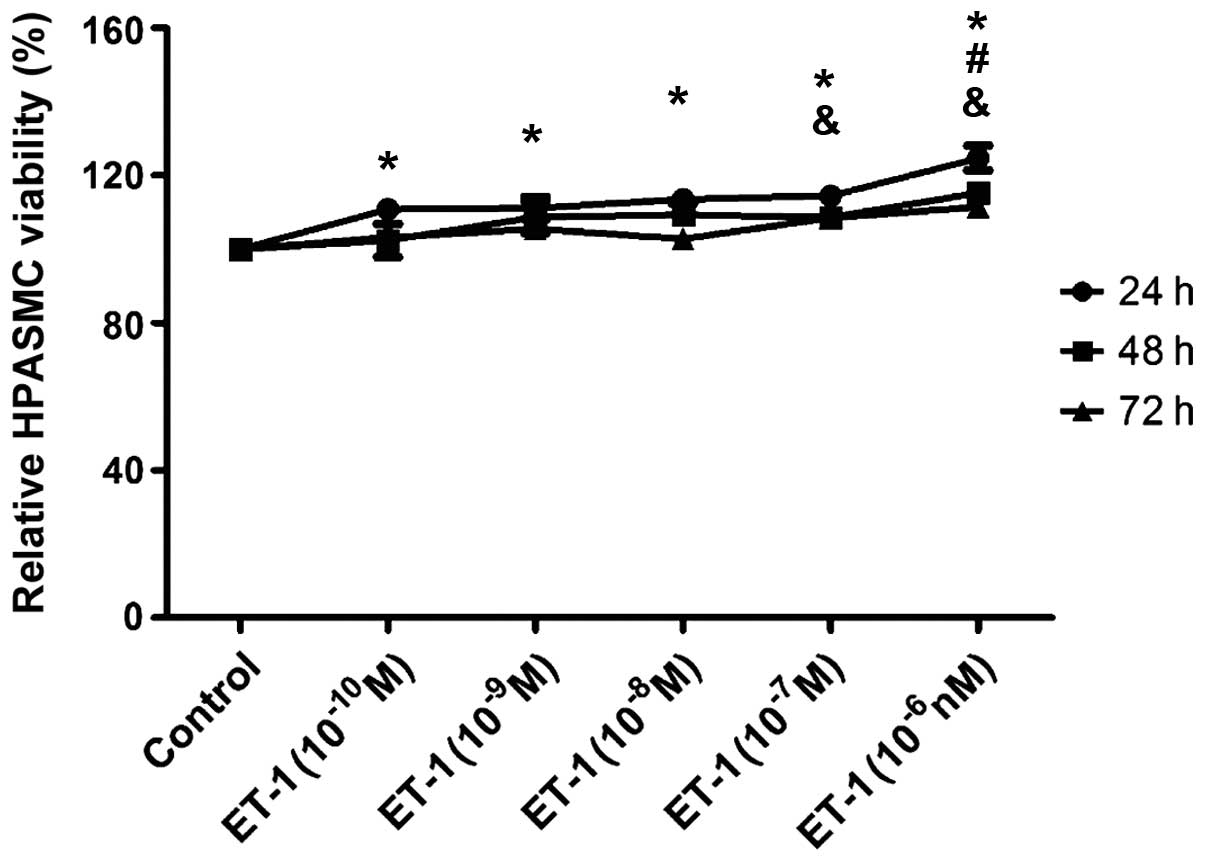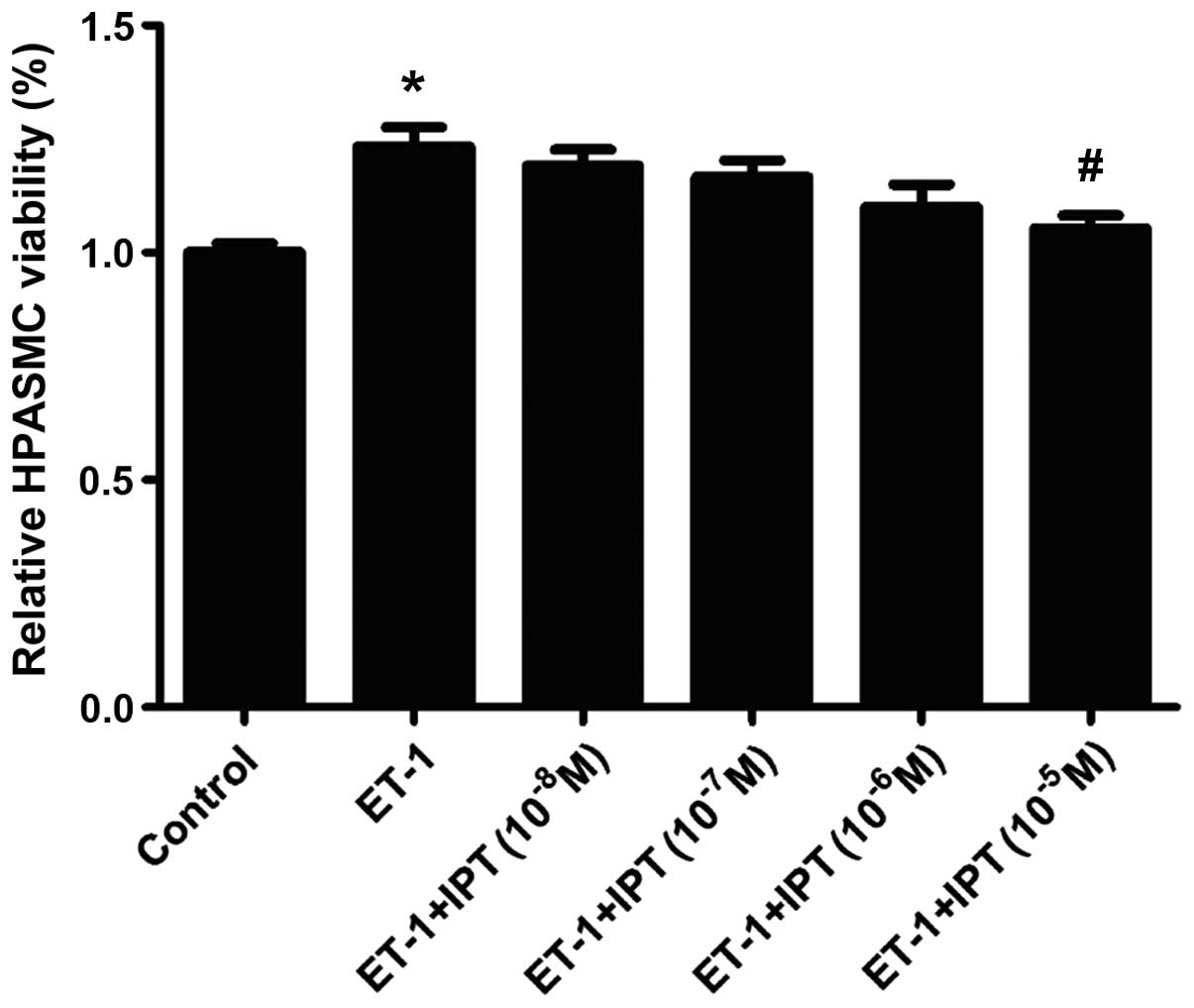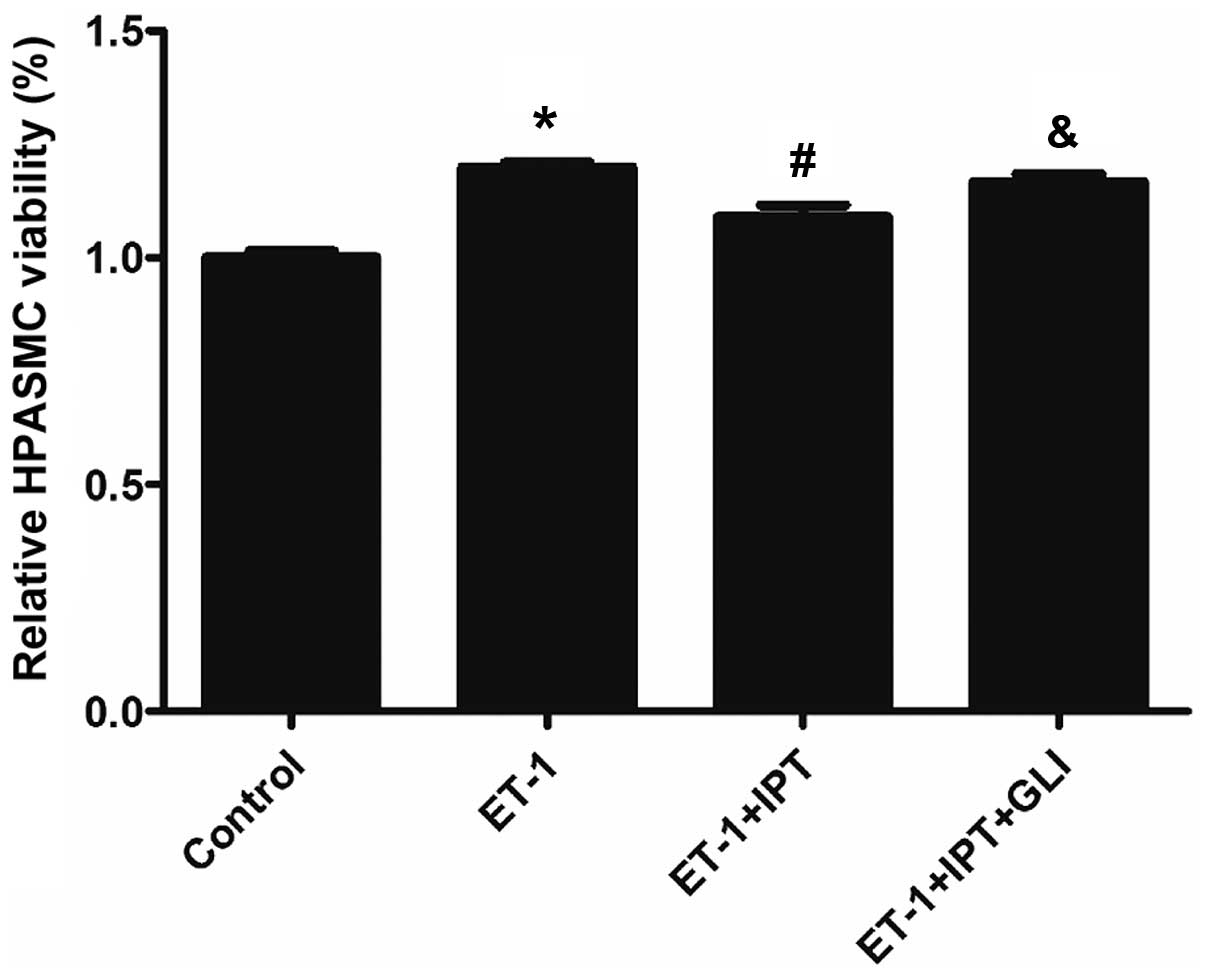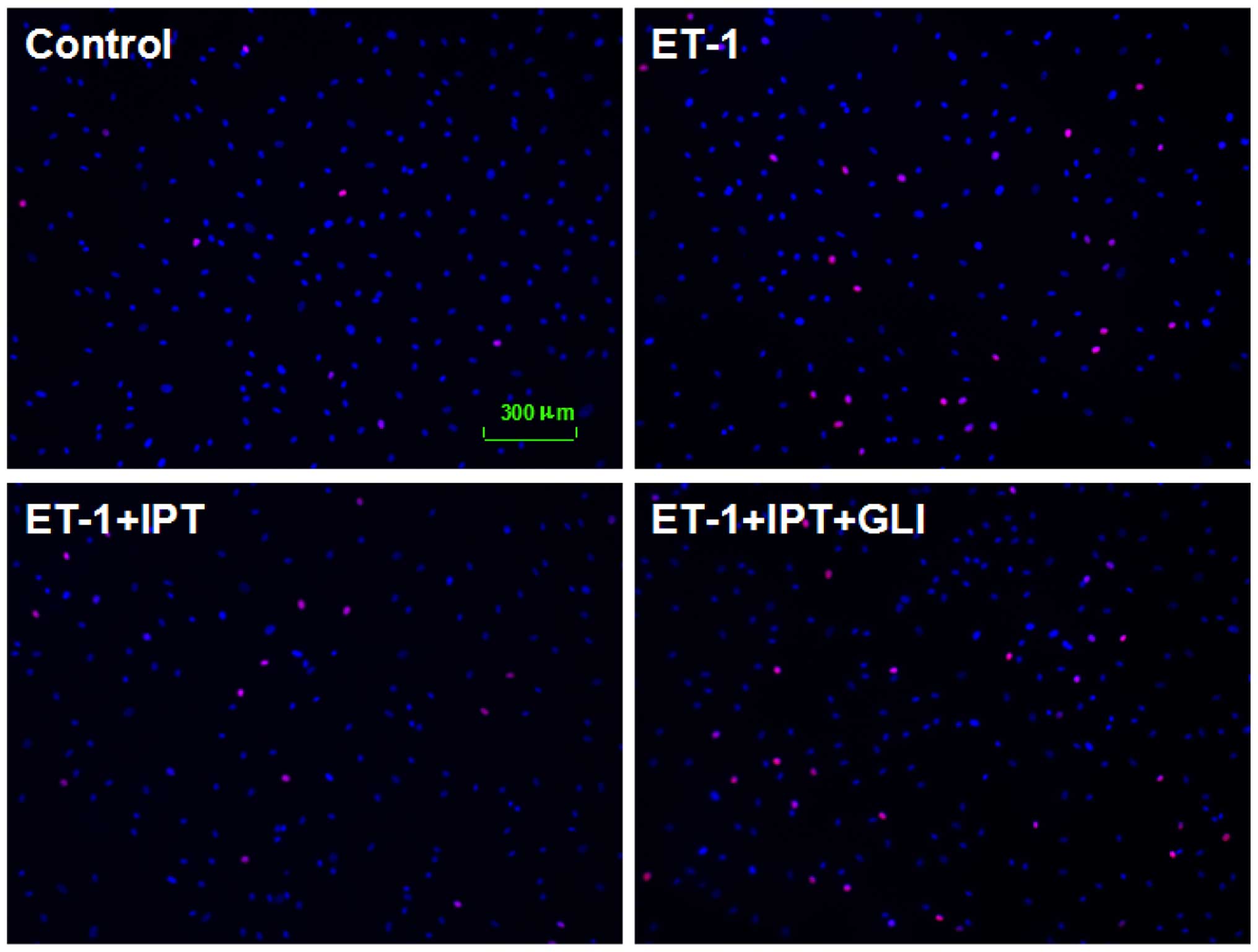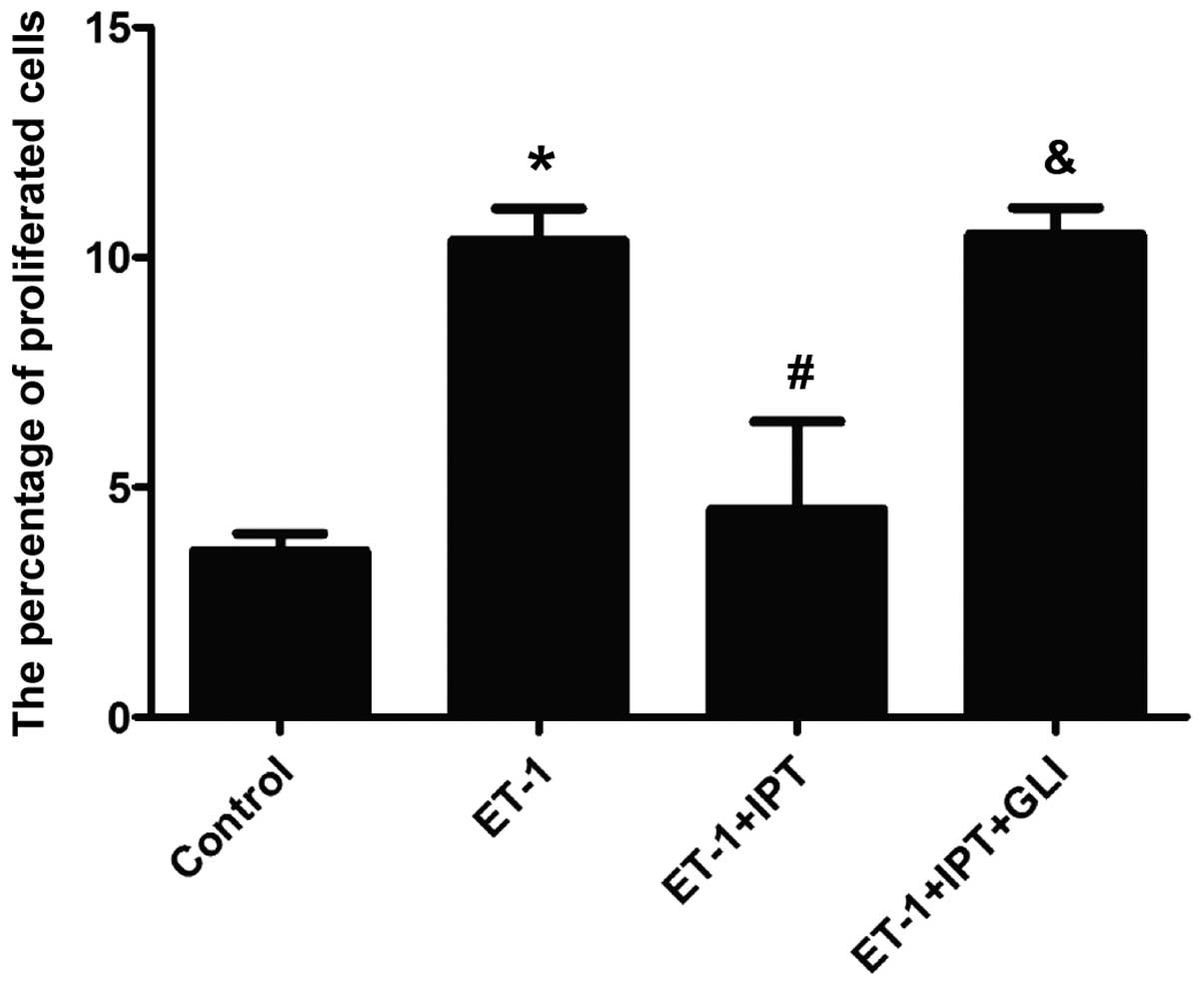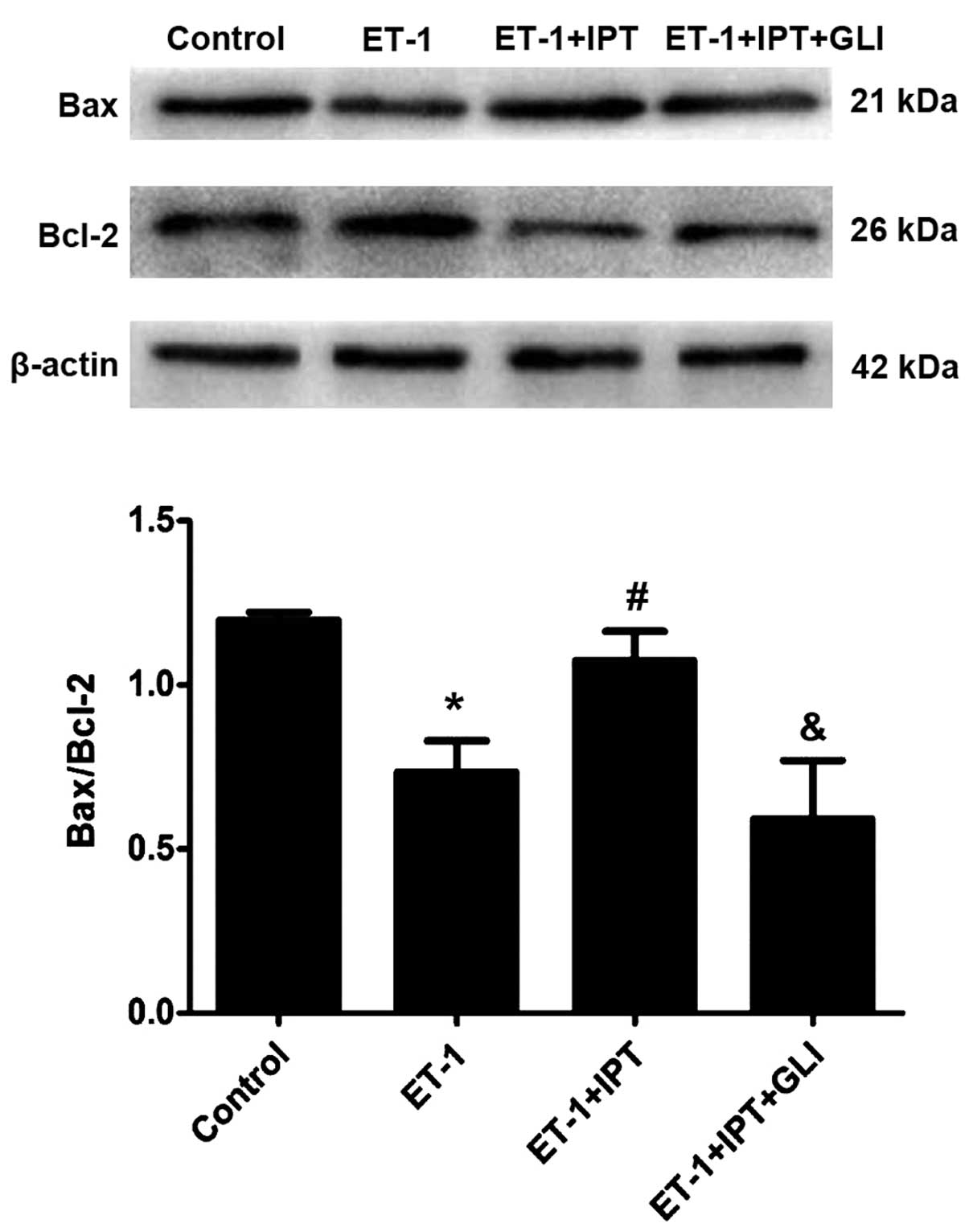|
1
|
Mandegar M and Yuan JX: Role of
K+ channels in pulmonary hypertension. Vascul Pharmacol.
38:25–33. 2002. View Article : Google Scholar : PubMed/NCBI
|
|
2
|
Saji T, Myoishi M, Sugimura K, Tahara N,
Takeda Y, Fukuda K, Olschewski H, Matsuda Y, Nikkho S and Satoh T:
Efficacy and safety of inhaled iloprost in japanese patients with
pulmonary arterial hypertension- insights from the IBUKI and AIR
studies. Circ J. 80:835–842. 2016. View Article : Google Scholar : PubMed/NCBI
|
|
3
|
Provencher S and Granton JT: Current
treatment approaches to pulmonary arterial hypertension. Can J
Cardiol. 31:460–477. 2015. View Article : Google Scholar : PubMed/NCBI
|
|
4
|
Krick S, Platoshyn O, Sweeney M, Kim H and
Yuan JX: Activation of K+ channels induces apoptosis in
vascular smooth muscle cells. Am J Physiol Cell Physiol.
280:C970–C979. 2001.PubMed/NCBI
|
|
5
|
Shimoda LA, Wang J and Sylvester JT:
Ca2+ channels and chronic hypoxia. Microcirculation.
13:657–670. 2006. View Article : Google Scholar : PubMed/NCBI
|
|
6
|
Bonnet S and Archer SL: Potassium channel
diversity in the pulmonary arteries and pulmonary veins:
implications for regulation of the pulmonary vasculature in health
and during pulmonary hypertension. Pharmacol Ther. 115:56–69. 2007.
View Article : Google Scholar : PubMed/NCBI
|
|
7
|
Wang J, Juhaszova M, Rubin LJ and Yuan XJ:
Hypoxia inhibits gene expression of voltage-gated K+
channel α subunits in pulmonary artery smooth muscle cells. J Clin
Invest. 100:2347–2353. 1997. View Article : Google Scholar : PubMed/NCBI
|
|
8
|
Moudgil R, Michelakis ED and Archer SL:
The role of K+ channels in determining pulmonary
vascular tone, oxygen sensing, cell proliferation, and apoptosis:
implications in hypoxic pulmonary vasoconstriction and pulmonary
arterial hypertension. Microcirculation. 13:615–632. 2006.
View Article : Google Scholar : PubMed/NCBI
|
|
9
|
Wiener CM, Banta MR, Dowless MS, Flavahan
NA and Sylvester JT: Mechanisms of hypoxic vasodilation in ferret
pulmonary arteries. Am J Physiol. 269:L351–L357. 1995.PubMed/NCBI
|
|
10
|
Standen NB and Quayle JM: K+
channel modulation in arterial smooth muscle. Acta Physiol Scand.
164:549–557. 1998. View Article : Google Scholar
|
|
11
|
Tang Y, Long CL, Wang RH, Cui W and Wang
H: Activation of SUR2B/Kir6.1 subtype of adenosine
triphosphate-sensitive potassium channel improves pressure
overload-induced cardiac remodeling via protecting endothelial
function. J Cardiovasc Pharmacol. 56:345–353. 2010. View Article : Google Scholar : PubMed/NCBI
|
|
12
|
Hampl V, Bíbová J, Banasová A, Uhlík J,
Miková D, Hnilicková O, Lachmanová V and Herget J: Pulmonary
vascular iNOS induction participates in the onset of chronic
hypoxic pulmonary hypertension. Am J Physiol Lung Cell Mol Physiol.
290:L11–L20. 2006. View Article : Google Scholar
|
|
13
|
Wang H: Pharmacological characteristics of
the novel antihypertensive drug, iptakalim hydrochloride, and its
molecular mechanisms. Drug Dev Res. 58:65–68. 2003. View Article : Google Scholar
|
|
14
|
Xie W, Wang H, Wang H and Hu G: Effects of
iptakalim hydrochloride, a novel KATP channel opener, on
pulmonary vascular remodeling in hypoxic rats. Life Sci.
75:2065–2076. 2004. View Article : Google Scholar : PubMed/NCBI
|
|
15
|
Xie W, Wang H, Ding J, Wang H and Hu G:
Anti-proliferating effect of iptakalim, a novel KATP
channel opener, in cultured rabbit pulmonary arterial smooth muscle
cells. Eur J Pharmacol. 511:81–87. 2005. View Article : Google Scholar : PubMed/NCBI
|
|
16
|
Oltvai ZN, Milliman CL and Korsmeyer SJ:
Bcl-2 heterodimerizes in vivo with a conserved homolog, Bax, that
accelerates programmed cell death. Cell. 74:609–619. 1993.
View Article : Google Scholar : PubMed/NCBI
|
|
17
|
Yin XM, Oltvai ZN and Korsmeyer SJ: BH1
and BH2 domains of Bcl-2 are required for inhibition of apoptosis
and heterodimerization with Bax. Nature. 369:321–323. 1994.
View Article : Google Scholar : PubMed/NCBI
|
|
18
|
Humbert M, Sitbon O, Chaouat A, Bertocchi
M, Habib G, Gressin V, Yaici A, Weitzenblum E, Cordier JF, Chabot
F, Dromer C, Pison C, Reynaud-Gaubert M, Haloun A, Laurent M,
Hachulla E and Simonneau G: Pulmonary arterial hypertension in
France: Results from a national registry. Am J Respir Crit Care
Med. 173:1023–1030. 2006. View Article : Google Scholar : PubMed/NCBI
|
|
19
|
Peacock AJ, Murphy NF, McMurray JJ,
Caballero L and Stewart S: An epidemiological study of pulmonary
arterial hypertension. Eur Respir J. 30:104–109. 2007. View Article : Google Scholar : PubMed/NCBI
|
|
20
|
Duffels MG, Engelfriet PM, Berger RM, van
Loon RL, Hoendermis E, Vriend JW, van der Velde ET, Bresser P and
Mulder BJ: Pulmonary arterial hypertension in congenital heart
disease: An epidemiologic perspective from a Dutch registry. Int J
Cardiol. 120:198–204. 2007. View Article : Google Scholar
|
|
21
|
van de Veerdonk MC, Marcus JT, Westerhof
N, de Man FS, Boonstra A, Heymans MW, Bogaard HJ and Vonk NA: Signs
of right ventricular deterioration in clinically stable patients
with pulmonary arterial hypertension. Chest. 147:1063–1071. 2015.
View Article : Google Scholar
|
|
22
|
Zhang S, Li G, Tian L, Guo Q and Pan X:
Short-term exposure to air pollution and morbidity of COPD and
asthma in East Asian area: A systematic review and meta-analysis.
Environ Res. 148:15–23. 2016. View Article : Google Scholar : PubMed/NCBI
|
|
23
|
Hassoun PM, Mouthon L, Barberà JA,
Eddahibi S, Flores SC, Grimminger F, Jones PL, Maitland ML,
Michelakis ED, Morrell NW, et al: Inflammation, growth factors, and
pulmonary vascular remodeling. J Am Coll Cardiol. 54(Suppl):
S10–S19. 2009. View Article : Google Scholar : PubMed/NCBI
|
|
24
|
Stenmark KR, Tuder RM and El KK: Metabolic
reprogramming and inflammation act in concert to control vascular
remodeling in hypoxic pulmonary hypertension. J Appl Physiol
(1985). 119:1164–1172. 2015. View Article : Google Scholar
|
|
25
|
Li P, Oparil S, Sun JZ, Thompson JA and
Chen YF: Fibroblast growth factor mediates hypoxia-induced
endothelin - a receptor expression in lung artery smooth muscle
cells. J Appl Physiol (1985). 95:643–651; discussion 863. 2003.
View Article : Google Scholar
|
|
26
|
Davie N, Haleen SJ, Upton PD, Polak JM,
Yacoub MH, Morrell NW and Wharton J: ET(A) and ET(B) receptors
modulate the proliferation of human pulmonary artery smooth muscle
cells. Am J Respir Crit Care Med. 165:398–405. 2002. View Article : Google Scholar : PubMed/NCBI
|
|
27
|
Sato K, Morio Y, Morris KG, Rodman DM and
McMurtry IF: Mechanism of hypoxic pulmonary vasoconstriction
involves ET(A) receptor-mediated inhibition of K(ATP) channel. Am J
Physiol Lung Cell Mol Physiol. 278:L434–L442. 2000.PubMed/NCBI
|
|
28
|
Sweeney M, Yu Y, Platoshyn O, Zhang S,
McDaniel SS and Yuan JX: Inhibition of endogenous TRP1 decreases
capacitative Ca2+ entry and attenuates pulmonary artery
smooth muscle cell proliferation. Am J Physiol Lung Cell Mol
Physiol. 283:L144–L155. 2002. View Article : Google Scholar : PubMed/NCBI
|
|
29
|
Hu HL, Zhang ZX, Zhao JP, Wang T and Xu
YJ: Effect of opening of mitochondrial ATP-sensitive K+
channel on the distribution of cytochrome C and on proliferation of
human pulmonary arterial smooth muscle cells in hypoxia. Sheng Li
Xue Bao. 58:262–268. 2006.In Chinese. PubMed/NCBI
|
|
30
|
Hu HL, Wang T and Zhang ZX: The effect on
the change of oxygen free radicals and cell proliferation in
hypoxic human pulmonary artery smooth muscle cells by mitochondrial
membrane potential. Chin J Tubercul Respiratory Diseases.
11:727–730. 2000.In Chinese.
|
|
31
|
Hu HL, Wang T, Zhang ZX, Zhao JP and Xu
YJ: Effect of diazoxide on change of H2O2 in
rat pulmonary artery smooth muscle cells and proliferation of
hypoxic rat pulmonary artery smooth muscle cells. Chin J
Pathophysiol. 23:2002–2006. 2007.In Chinese.
|
|
32
|
Hu HL, Wang T and Zhang ZX: The effect on
the distribution of cytochrome C and cell proliferation in hypoxic
rat pulmonary artery smooth muscle cells by mitochondrial membrane
potential. Proceedings of Huazhong University of Science and
Technology (Medicine). 166–169. 2802008.In Chinese.
|
|
33
|
Zeng H, Kong X, Peng H, Chen Y, Cai S, Luo
H and Chen P: Apoptosis and Bcl-2 family proteins, taken to chronic
obstructive pulmonary disease. Eur Rev Med Pharmacol Sci.
16:711–727. 2012.PubMed/NCBI
|















